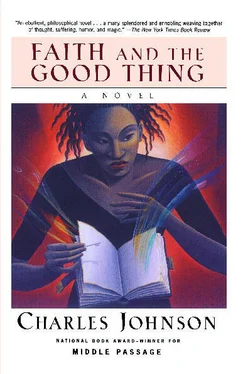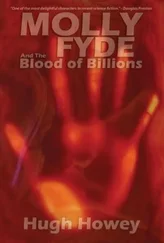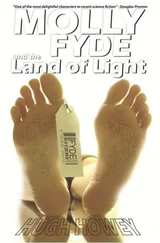Jones looked down at her and chuckled deep in his throat. “We’d better stop, or your father’ll whop my tail like he use to.”
“Huhn?” Faith allowed him to direct her inside his single-room apartment. “I don’t understand. ”
“Coffee?” he asked.
Faith declined. She took a seat on the corner of his bed — just a mattress, really, lying flat with half its white stuffings falling to the floor. Jones walked barefoot to a hot plate across the room and started water boiling for instant coffee. A few groceries — unopened cans of butter beans, corn and cabbage, bottles of cheap wine and unopened boxes of instant potatoes — were stacked along the eastern wall behind a hot plate and beside a small refrigerator. His room reminded her of her own at the hotel: bare wooden floorboards with splinters sticking up like sharp needles, a low ceiling with a naked bulb in its center, and dingy walls. But the walls were covered in places with preliminary charcoal sketches. Half-finished canvases lay about and crushed tubes of paint were underfoot, their contents worked into the texture of the floor. The room had a feeling of presence and warmth that glowed behind Jones’s poverty. No — that word was wrong. It revealed not poverty but a sort of voluntary retreat from the world, similar to the atmosphere of a treehouse or a cave where children hide from their parents and talk about girls (or boys) and terrify one another with ghost stories. Beside it, her apartment was spiritual slum. Relaxing, she noticed an in-progress painting in the center of the room; she remembered the face well: the Swamp Woman.
Jones poured his coffee into a tin cup, which he held in both hands, and sat down beside her on the mattress. Closer to her now, he seemed slimmer, shorter, and not at all like Big Todd. His sleeves were rolled up to his elbows, and she could see a tattoo around his neck with this legend beneath it: Cut on dotted line.
“Your daddy used to wallop me whenever I got funny with you, remember?” he said.
Faith searched her memory. She found nothing there. “Daddy was dead when I first met you. ”
“He was dead all right,” Jones laughed, “but his ghost could exfluncticate any man alive. Believe it.” He sipped at his coffee, set it down, and rubbed his arms. “You ’member that time on your porch when I first run my hand down the front of your dress? And I flew outta my chair and ran off down the field, you remember?”
It was coming back. Slowly she recalled being seated with him on the wide farmhouse porch, late at night after Lavidia had gone to bed. The heaviness of the air returned to her. It was thick with humidity and smelled of rain after a short-lived sprinkle that left gleaming pools of water along the steps of the porch. She remembered the heavy moonlight floating in those puddles beyond the yard, the fluffy drifting balls of fur from pussy-willow trees that moved around their heads like fairies, or daydreams. They had watched the rain, enjoying each other too much, had been driven closer together by the thunder, and then the stillness, the heat and oppression of night. They ran out of talk. Jones wiggled closer to her on the top step of the porch, put his arm around her waist, and waited for her reaction. She could do nothing. She’d wanted him there, that close. Closer. But what of her reputation and pride? The trees were watching her, the summer moon and animals hidden out there in the bushes and trees. They saw her sit without protest as he dropped his hand inside her dress. They were jealous. She could feel it, because she felt she belonged to their world and not that of men, because she’d walked among them, her feet slipping on moonflower vines, her ears hearing and loving every birdsong of morning. They might never forgive her. But she let Jones have his way until he’d been hurled away from her. He pitched forward off the porch and into the mud, where his head crashed and his arms flew out wild. Without a word, he’d taken off, stumbling through the yard, falling flat on his face, and eventually vanishing from sight.
“That was awful strange,” Faith said. She found she could not look at him, especially into his eyes. It involved too much. “I thought maybe you had a nervous condition, and had an attack or something. That’s why I never asked about it.”
Jones slapped his knee. “Hit was your old man! Soon as I lay my hand on you, he came along with a haymaker hot enough to set the Mississippi on fire.” He imitated the move with his own fist, hitting his jaw, and fell back on the mattress. “He planted hit dead on my chin. Believe hit! I looked up from the floor, and there he was — all big and black and bristlin’ mad, standin’ between us on the steps. So I started travelin’. I ain’t use to fightin’ haints — no sir! I’ve fought some strange things in my time, but I wanted to be ready for him, to have hit out with him in the open. ”
“It was Daddy?” Faith shook her head and stared at the floor. “ I didn’t see anything.”
“Swear fo’ God,” Jones said, and he crossed himself once. “So I went out to the fields when I left you, and waited for him. Sho ’nuff, he came floatin’ in toward me on the air. Like smoke. I swung at him, but my hand went right through his chest. Then he slapped me upside my haid, and stood over me, shoutin’, ‘You mess with my baby ’gain, and I’ll whop yo’ tail clean into next week! Well, I figured I couldn’t mess with nothin’ like that. But I had to see you again, right?”
“Yes,” Faith said. She pulled her lower lip, kneading it between her finger and thumb. He was lying — she could smell it (lies smell sweet, children: somewhat like a fresh biscuit), but she said, “That does sound like Daddy—”
“Yep,” Jones continued after finishing his coffee, “so I ran straight down to the swamps, and looked up that old witcher ’ooman.”
Faith rose and went to the half-finished oil portrait. The outline of the Swamp Woman’s head dominated the center of the picture; her yellow eye was shut tight, the green one shone as bright as jade. Faith turned to Jones, her head pounding with pressure.
I didn’t have nothin’ ’gainst your daddy,” Jones said, “but he was standin’ in my way. You know how fathers are — they don’t think no body’s good enough for their daughters. Anyway, the witcher ’ooman heard me out, and gave me somethin’ to overcome anybody that got in my way. I think I still got hit.”
“A mojo?” Faith said.
“Just a minute—” Jones stood up and fumbled for the frayed billfold in his hip pocket; from it he produced a square strip of white cloth bearing red and black letters:
A I K N
P R M C
D H T R
M M P M
“She wrote it for me during the full moon,” he said, “and she told me to go straight to the graveyard where your daddy was buried — where his haint would be waitin’ for me to have hit out once and for all. ”
Faith hurried to the mattress where Jones had sat down again, picking at his toenails. “What happened then?”
“Oh, I got there at ’bout midnight. Hit was so dark I couldn’t make out none of the headstones. I kept hearing noises, too. Laughter. They scared me. I wasn’t but twelve years old then. This big wind came up, then a mighty grist of rain — noises flew up from the ground all around me, like chains were rattlin’ somewhere. Honey, I wanted to run home. Believe hit. But you had my nose wide open. I woulda wrestled with the Devil and walked a hundred miles jes to keep on seein’ you. Sho! But jes when I thought I couldn’t stand hit no longer, when I thought my blood was ’bout ready to turn to water, I heard another sound behind me, turned around shakin’, and saw your daddy behind me — whiter all over than if he’d jumped in a vat of milk, and twice the size he was when he was livin’. ‘You ain’t give up yet?’ he said. The rain started ’gain, and hit got into my eyes. I could hardly see, and my legs and arms were as stiff as wood. I shouted, ‘No!’ and then he came at me, his big fists flyin’ through the air. I shouted what the witcher ’ooman told me to: As the eternal fires of West Hell burn, let my adversary twist and turn! And he stopped jes short of hittin’ me, his eyes popped open, and he started turnin’ around in circles and screamin’—”
Читать дальше












